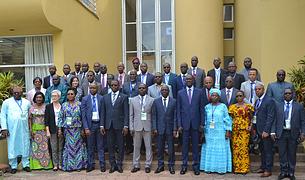
From 8 to 11 October 2019, the WAEMU Commission, in collaboration with the Foundation for Research and Studies on International Development (FERDI) and the Circle of Reflection and Exchange of Tax Administration Leaders (CREDAF), organized a workshop in Abidjan to exchange and share experiences in the evaluation of tax expenditures.
The meeting was attended by representatives of the Member States, of the WAEMU Commission, of the European Union, of the Ministry of Europe and Foreign Affairs of the French Republic, of FERDI and CREDAF.
The opening ceremony was presided by Adama Sall, Director of the Minister's Cabinet to the Prime Minister in charge of the Budget and State Portfolio, in the presence of Gustave Diasso, resident representative of the UEMOA Commission in Côte d'Ivoire, and Ouattara Sié Abou, Director-General of Taxes of Côte d'Ivoire.
In their opening address, the hight personalities recalled that WAEMU Member States face a major challenge in mobilizing tax revenues. Efforts are seriously undermined by tax expenditure linked to derogations granted as part of the economic and social policy of the Member States.
The workshop was therefore held in a context marked by the desire of the highest authorities of WAEMU to rationalize tax expenditures.
Its objective was to enable tax policy officials to strengthen their capacity to evaluate derogations to provide the authorities with useful information on their impact on the state budget and to harmonize national practices to make tax expenditure reports comparable.
The work program included the following points:
1. Presentation of papers by the WAEMU Commission and Ferdi
2. Presentations of Member States' experiences in evaluating tax expenditure
3. Group work
Anne-Marie Geourjon and Emilie Caldeira spoke on :
- Definition and identification of tax expenditures
- Identification of data and scope for evaluating tax expenditures
- Methods of assessing tax expenditures
- Evaluate the economic and social impact of tax expenditures